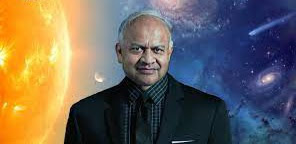Dr. JAYANT NARLIKAR (1938–2025)
“A communicator of science leaves behind a huge void.”
On 20 May 2025, India bid farewell to one of its most brilliant minds — Dr. Jayant Vishnu Narlikar, an internationally renowned astrophysicist, prolific science writer, and passionate science communicator. Revered for his contributions to cosmology and for bringing science closer to the common citizen, Dr. Narlikar’s legacy transcends generations and disciplines.
Early Life and Education: Born on 19 July 1938 in Kolhapur, Maharashtra, Jayant Narlikar was destined for a life of scholarship and inquiry. His father, Vishnu Vasudev Narlikar, was a noted mathematician and physicist who served as Head of the Mathematics Department at Banaras Hindu University (BHU). His mother, Sumati Narlikar, was a scholar of Sanskrit, and his maternal uncle, V. S. Huzurbazar, was a renowned statistician — making his upbringing steeped in intellectual rigor and curiosity.
He completed his early education at Central Hindu College, Varanasi, and earned his BSc from BHU in 1957. He then proceeded to Cambridge University to study mathematics at Fitzwilliam College, following in his father's footsteps. At Cambridge, he quickly distinguished himself — graduating in 1959 as Senior Wrangler, the title awarded to the top mathematics undergraduate.
Academic Excellence and Research Career: While at Cambridge, he earned the Tyson Medal for Astronomy (1960) and Smith’s Prize (1962) during his doctoral work. Under the mentorship of the legendary astronomer Sir Fred Hoyle, he completed his PhD in 1963. Together, they developed the Hoyle–Narlikar theory of conformal gravity, which offered a Machian alternative to Einstein's general relativity. The theory proposed that a particle's mass is influenced by the distribution of mass throughout the universe — an idea with deep philosophical and scientific implications.
Dr. Narlikar also earned a master's degree in astronomy and astrophysics in 1964 and remained a Fellow at King’s College, Cambridge until 1972. He was a founding member of the Institute of Theoretical Astronomy, established by Hoyle in 1966.
Return to India and Institutional Leadership: In 1972, Dr. Narlikar returned to India, joining the Tata Institute of Fundamental Research (TIFR) in Mumbai, where he led the Theoretical Astrophysics Group. In 1988, he became the Founder-Director of the Inter-University Centre for Astronomy and Astrophysics (IUCAA) in Pune, a premier institution that nurtures academic collaboration among Indian universities.
His role in building India’s scientific infrastructure was pivotal. He chaired the Advisory Group for NCERT Textbooks in Science and Mathematics, ensuring high-quality science education for millions of students across the country.
Scientific Contributions and Collaborations: Dr. Narlikar’s research spanned quantum cosmology, Mach’s principle, and action-at-a-distance theories. He explored alternative models of the universe that challenged the dominant Big Bang paradigm. His work was foundational in opening new perspectives in cosmology and promoting scientific pluralism.
He also collaborated on an intriguing study that isolated microorganisms from stratospheric air samples at 41 km altitude, opening discussions about panspermia — the possibility that life exists beyond Earth.
He served as President of the Cosmology Commission of the International Astronomical Union (1994–1997) and was a founding member of the World Cultural Council in 1981.
Awards and Recognition:
Dr. Narlikar received numerous prestigious awards and honours:
Padma Bhushan and Padma Vibhushan (India's third and second highest civilian honours)
Maharashtra Bhushan Award
Shanti Swarup Bhatnagar Award
M. P. Birla Award for excellence in astronomy
Prix Jules Janssen by the French Astronomical Society
Atmaram Award (Central Hindi Directorate)
Indira Gandhi Award (Indian National Science Academy)
Kalinga Prize by UNESCO (1996) for popularising science
He was a Fellow of the Indian National Science Academy, the Indian Academy of Sciences, and the National Academy of Sciences, India, as well as the Third World Academy of Sciences (TWAS). He was also an Associate of the Royal Astronomical Society of London.
Science Communicator and Writer: Beyond the lab and lecture hall, Dr. Narlikar was a passionate science communicator. He authored numerous popular science books, essays, and articles, making complex concepts accessible to lay readers in English, Marathi, and Hindi.
He appeared in radio and television programmes, and even featured in Carl Sagan's acclaimed documentary series, Cosmos: A Personal Voyage, where his work on alternative cosmologies was highlighted.
He also wrote science fiction and stories for children, using narrative to ignite curiosity and imagination. His Marathi autobiography, Chaar Nagarantale Maze Vishva ("My World of Four Cities"), won the Sahitya Akademi Award in 2014.
Legacy: Dr. Jayant Narlikar will be remembered not just as a pioneering scientist, but as a bridge between science and society. Through his rigorous scholarship and unwavering commitment to public understanding of science, he shaped minds and institutions alike.
He leaves behind a universe enriched by his vision — and a void that will be deeply felt in India and the global scientific community.
“We are made of star-stuff,” Carl Sagan once said. In Dr. Jayant Narlikar, the stars gifted us a rare mind — one that sought answers beyond the known, and brought the cosmos a little closer to Earth.





